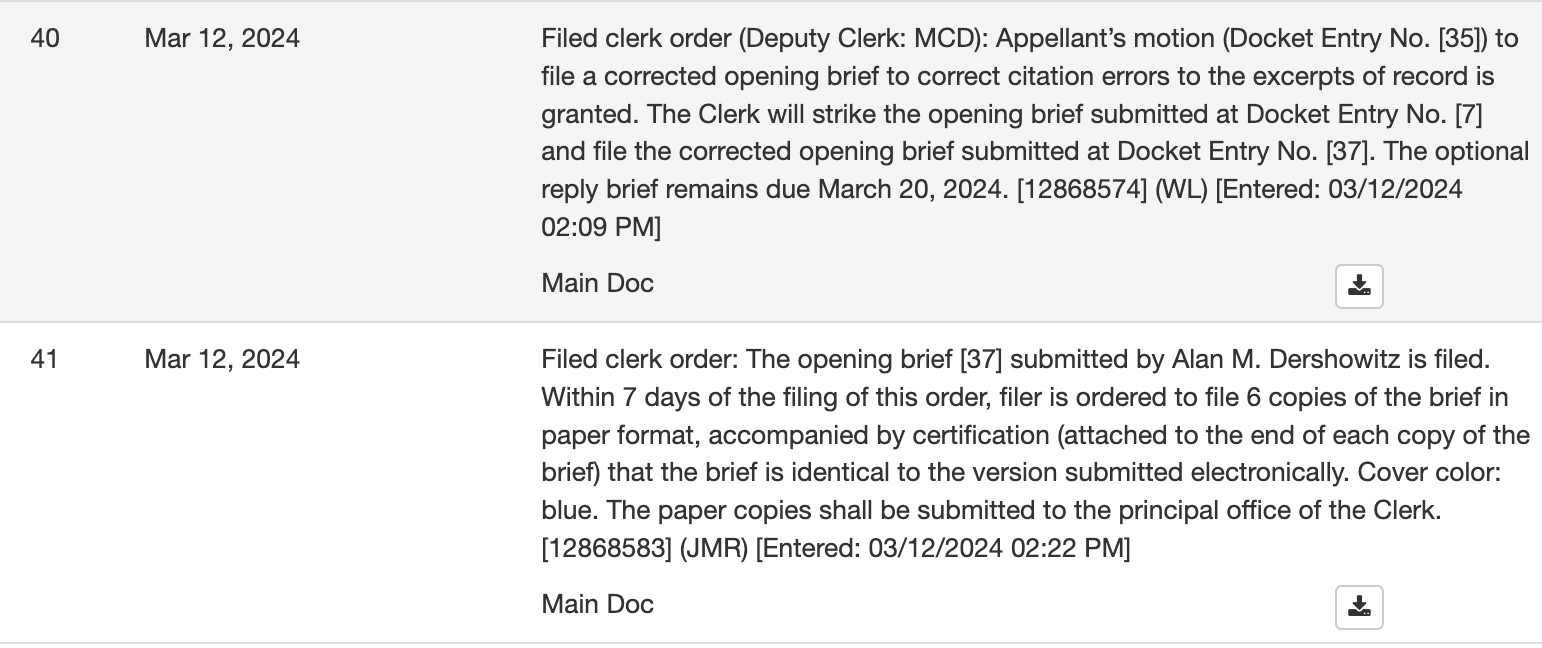[ad_1]
(Picture by JIM WATSON/AFP through Getty Pictures)
On March 5, 2022, pillow puffer Mike Lindell vowed to sue “all of the machines” and do away with digital voting. On March 9, 2024 he promised to hand-deliver proof to the Supreme Court docket “to avoid wasting this nation!”
And people two instances are the identical case.
Right here at ATL, now we have devoted many pixels to this Lindell-subsidized LOLsuit because of the involvement of 1 Alan M. Dershowitz, who managed to get himself sanctioned together with the remainder of the attorneys concerned on this ridiculous train. Choose John Tuchi was unmoved by Dersh’s plea that he was merely “of counsel” and/or too previous and sick to be sanctioned. The court docket was additionally unpersuaded by the professor’s offer to draft a law review article explaining why sanctions shouldn’t apply.
The enjoyable seems to be continuing on the ninth Circuit.

The case was filed in spring of 2022 in Arizona by gubernatorial candidate Kari Lake and secretary of state candidate Mark Finchem, who presupposed to be searching for a judicial order mandating that the state use paper ballots for the upcoming election. In actuality Arizona has accomplished precisely that for years, and so they’ve now wandered off to make a pointless argument about standing.
In his dismissal, Choose Tuchi famous that this might have been instantly obvious had the plaintiffs’ counsel bothered to conduct “the factual and authorized pre-filing inquiry that the circumstances of this case fairly permitted and required.” The trial court docket imposed sanctions on the attorneys, and the ninth Circuit has proven no interest in sticking their noses on this specific cow pie.
However worry not, children, as a result of Mike Lindell is bringin’ it to SCOTUS (again!) with a petition for certiorari that may make elections nice once more.
The argument is that, in gentle of Bush v. Gore, the Supreme Court docket inadvertently made it too tough to mount election challenges by limiting each standing and the window for reduction.
Institutional inertia from having intervened within the 2000 election shouldn’t sideline this Court docket’s assessment of latest systemic flaws in our elections. Certainly, the Court docket’s latest selections have created a “Goldilocks drawback’” that solely this Court docket can resolve. On the too-cold facet, Lance v. Coffman, 549 U.S. 437 (2007), has come to face for the proposition voters can’t assert claims underneath the Elections and Electors Clauses. On the too-hot facet, Purcell v. Gonzalez, 549 U.S. 1 (2006), posits that election-law challenges introduced by candidates—as soon as the candidates are identified—come too near elections. Instances are by no means “good” for voters or candidates to problem the wholesale bombardment of States’ election-integrity legal guidelines or practices that determine shut elections.
That could be a very beneficiant interpretation of SCOTUS’s use of Purcell, however maybe the justices will likely be extra open to Lake’s proposed resolution, which is that they need to have interaction in an enormous energy seize and rewrite state election legal guidelines wholesale.
First, the Court docket ought to summarily reverse right here, whereas limiting Lance to its precise holding.
Second, as a part of implementing Moore v. Harper, 143 S.Ct. 2065 (2023), the Court docket ought to decide to taking over an error-correcting function for justiciability in election challenges, at the least till decrease courts perceive what Article III covers and what it doesn’t cowl.
You possibly can by no means go fallacious telling the Roberts court docket to arrogate energy to itself, proper?
As for the “new” proof, it seems to quantity to the identical nonsense rejected by the trial court docket. Lake repeats the declare that Maricopa County broke the legislation by utilizing uncertified gear, regardless of this being completely debunked by Choose Tuchi. She additionally cites Curling v. Raffensperger, a case ongoing in Georgia, as proof that poll marking gadgets are vulnerable to tampering. The truth is, Arizona solely makes use of BMDs for visually impaired voters, and even these generate a backup paper poll.
In brief, this appears extremely unlikely to lead to nationwide hand-counted elections — which is an efficient factor, for the reason that plaintiffs’ “proof of idea” is the Arizona “audit” which took six entire months. However the petition did give Lindell one other car to fundraise, so let’s name it a win.
Lake v. Fontes [District Docket via Court Listener]
Lake v. Fontes [Circuit Docket via Court Listener]
Lake v. Fontes [SCOTUS Docket]
Liz Dye lives in Baltimore the place she produces the Legislation and Chaos substack and podcast.
Matters
[ad_2]
Source link

